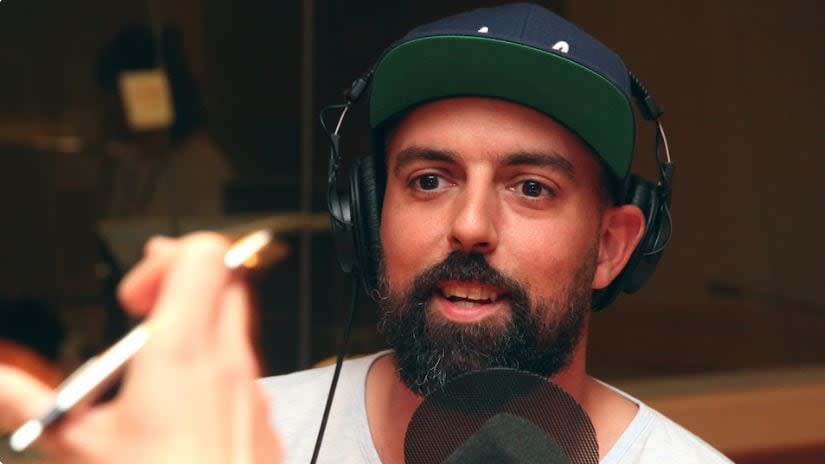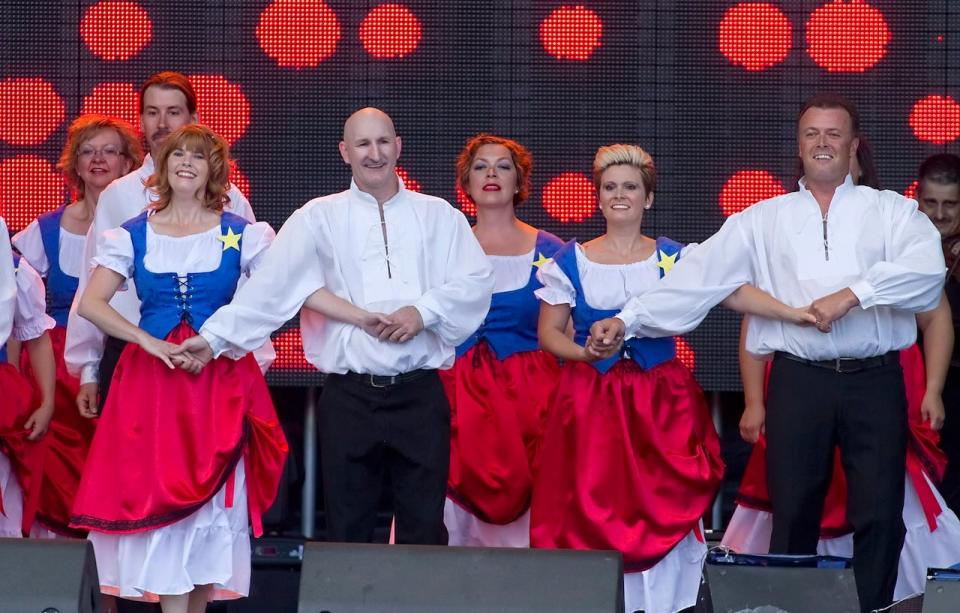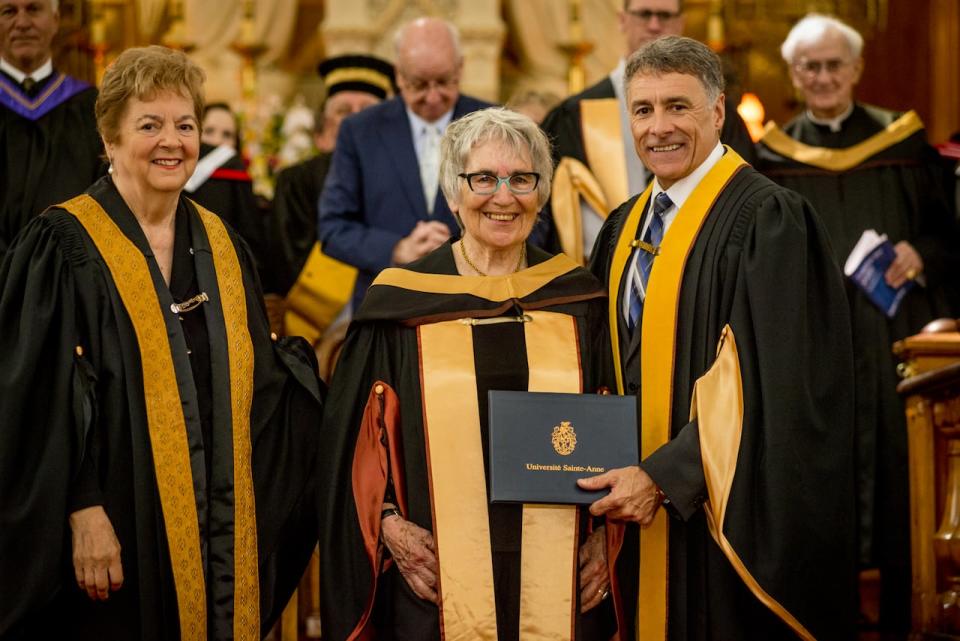'My trademark is my accent': Acadians embracing their brand of French

Jacques Alphonse Doucet was in high school when he was at a Burger King in Quebec and ran into a language problem.
Doucet, who is originally from the Clare, N.S., area, was trying to order in French. But there was a problem. With Doucet's Acadian accent, the employee requested he speak English instead.
"I couldn't understand a word she was saying in English and she couldn't understand anything in French, so it was just a weird situation," said the 41-year-old.
It wasn't the only time during the trip that people asked him to speak English.
"But by … the end of the week, I was kind of insecure," said Doucet. "Then I was really insecure about my French because I was told it was so bad for so long and I was a bit frustrated."

Acadians fill the streets of Caraquet, N.B., for the Tintamarre parade to commemorate National Acadian Day on Aug. 15, 2018. (Chris Donovan/The Canadian Press)
Growing up, Doucet spoke French at home and was even educated in school in French, but some teachers told him he spoke poor French.
Experiences like this contributed to Doucet experiencing something academics call linguistic insecurity, which is the discomfort of speaking a language because of cultural and other social reasons.
Linguistic insecurity
Annette Boudreau, a retired University of Moncton professor, studied the topic for decades.
"The norms in French are very strict compared to the English language, for example," she said.
"I think that in the English language people accept more varieties, accept that there are different accents, that people can speak English in different ways. There is not as much prejudice on the people who speak English."
Acadians aren't alone in experiencing linguistic insecurity, said Boudreau. For example, she said some Belgian people experience it because their French sounds different from what is spoken in neighbouring France.
Boudreau said she's noticed Acadians are more confident in speaking French than they used to be. She said part of this is because of the World Acadian Congress, a gathering and celebration of Acadian culture that takes place every five years. The first one was held in 1994 in Moncton. The 2024 edition is being held in southwestern Nova Scotia.

Radio Radio ham it up for the cameras as they arrive at ADISQ, the Quebec music industry awards in Montreal on Nov. 2, 2008. The group started with four members, but is now made up of Doucet, second from left, and Gabriel Louis Bernard Malenfant, left. (Graham Hughes/The Canadian Press)
"It had a tremendous impact because people came from all over the world with their different ways of speaking French, people started having confidence in their way of speaking," said Boudreau.
She said this confidence shows in ways you wouldn't have seen before. For example, she mentions French-speaking Maritime artists today are not only performing in French — as opposed to English — but doing so without trying to hide their accents, such as Lisa LeBlanc, P'tit Belliveau and Radio Radio.

The crowd at Scene - TV5MONDE cheers as Radio Radio performs in downtown Lafayette, La., in 2012. (Leslie Westbrook/The Lafayette Daily Advertiser/The Associated Press)
Fittingly, one of the rappers in Radio Radio is Jacques Alphonse Doucet.
"We said, 'You know what, the hell with what they're saying,'" said Doucet. "Let's be proud of our dialect. We had two guys from New Brunswick, two guys from Nova Scotia, and so Chiac [a mix of English and French] and Acadien, the two different dialects. We said let's rap like we speak and just have fun and not make any compromises. Let's do it for us."
Doucet said there was pressure to have more of a French or Québécois sound early in his career, but he drew inspiration from American rappers and their accents. He said their accents didn't make them sound generic, like late 1980s hip-hop.
"Why not just be proud of who we are? It's more authentic instead of trying to fake something," said Doucet, who has performed in countries including France, Belgium, the U.S. and China.
While some teachers criticized Doucet's French, a message from one of his teachers resonated.
"It's great that you speak the way you do, but you need to also understand how to at least write so everybody in the world can understand you," Doucet remembers the teacher saying.
"And that was kind of like, OK, I respected the way he was thinking about it."
Sally Ross, a Nova Scotia writer and translator specializing in Acadian history, said when talking about linguistic insecurity faced by Acadians in Nova Scotia, it's important to remember the role the education system played.

An Acadian dance troupe performs during the opening ceremony of the Acadian World Congress in Edmundston, N.B., in 2014 . (Clement Allard/The Canadian Press)
"The philosophy of the Department of Education from the mid-1850s to the 1980s was basically to assimilate, to ensure that Acadians spoke English and maybe a bit of French, but they weren't the least bit interested in ensuring that Acadian children could read and write in both languages," said Ross.
She said that changed with the introduction of the federal Official Languages Act in 1969, which made English and French Canada's official languages.

Sally Ross, centre, receives an honorary doctorate in history in 2019 from Université Sainte-Anne. She is a writer and translator who specializes in Acadian history. (Université Sainte-Anne)
Ross said the Charter of Rights and Freedoms, which was enacted in 1982, provided further protections.
"I find it absolutely miraculous that a language that started here in the 1600s can survive given all the vicissitudes and discrimination that Acadians have gone through, can survive intact wonderfully," she said.
Hometown return
Doucet, who now calls the Franco-Ontarian community of Hawkesbury home, is looking forward to this year's World Acadian Congress. Not only will he see family, but Radio Radio is playing an Aug. 14 show at Université Sainte-Anne's Le Château venue.
It's a fitting place for Doucet to play given he got his undergraduate degree from the Church Point, N.S., university. Not only that, he said while there he was sometimes told he'd need better French to succeed in the world.
"My trademark is my accent, and I'm happy about it," said Doucet.
MORE TOP STORIES


